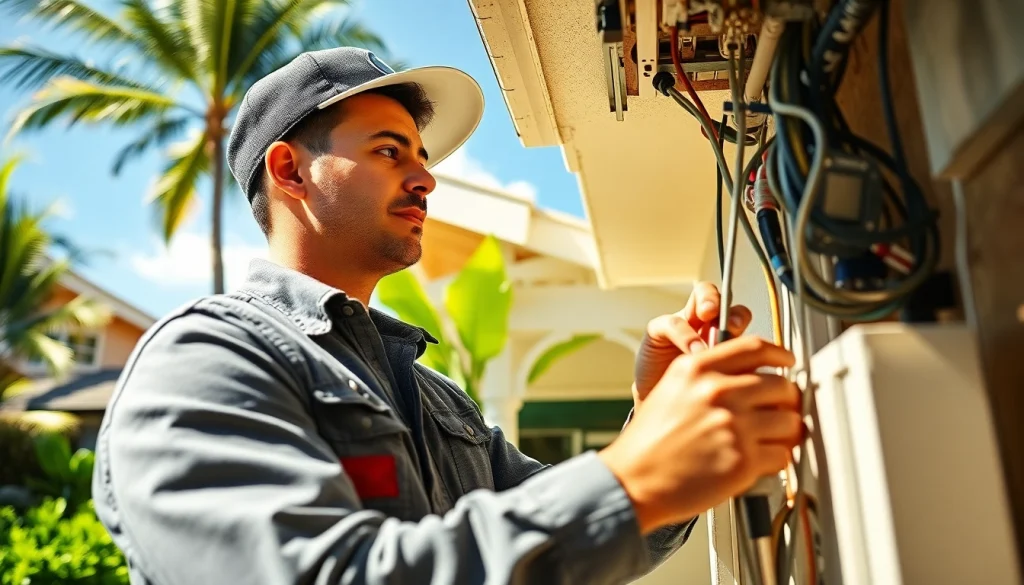Understanding Electrician Apprenticeship Hawaii
What is an Electrician Apprenticeship?
An electrician apprenticeship is a structured training program that combines hands-on experience on the job with classroom education. In Hawaii, this program is designed to provide aspiring electricians with valuable skills, knowledge, and experience necessary to work in the electrical field. Electrician apprentices typically work under the supervision of experienced electricians, allowing them to learn practical skills while completing coursework related to electrical systems, safety practices, and regulations. This dual approach ensures that apprentices are well-prepared for the demands of the profession by the end of their training period.
Benefits of Completing an Electrician Apprenticeship Hawaii
Completing an electrician apprenticeship in Hawaii offers numerous benefits. Firstly, apprentices gain direct, hands-on experience in a variety of settings, which helps them develop critical skills that cannot be learned in a classroom alone. This practical training enables them to tackle real-world problems and enhances their employability upon completion of the program.
Additionally, apprentices earn while they learn. They receive a competitive wage throughout their training, allowing them to support themselves while acquiring the skills they need to advance their careers. Furthermore, many employers prioritize hiring individuals who have completed an electrician apprenticeship, as it demonstrates commitment, skill, and professionalism.
Another significant benefit is the opportunity for networking within the industry. Apprentices often forge relationships with seasoned professionals, which can lead to future job opportunities and mentorship. Completing an electrician apprenticeship Hawaii also qualifies individuals for necessary certifications and licensing, making them more competitive in the job market.
Eligibility Requirements for Apprenticeships
To qualify for an electrician apprenticeship in Hawaii, candidates typically need to meet several eligibility criteria. Generally, applicants must be at least 18 years old and possess a high school diploma or GED. A keen interest in the electrical trade is crucial, alongside a willingness to learn and work diligently.
Some programs may also require candidates to pass a basic math and reading assessment to ensure they have the foundational skills necessary to succeed. Additionally, a valid driver’s license is often required, as apprentices may need to commute to different job sites. Background checks may also be conducted to ensure applicants meet specific safety and security requirements.
The Application Process for Electrician Apprenticeship Hawaii
Researching Available Programs
Research is a vital first step in the application process for an electrician apprenticeship Hawaii. Prospective apprentices should explore various programs available across the islands, which can differ in structure, duration, and training style. The primary organizations offering electrician apprenticeships often include unions, training centers, and community colleges. Each of these programs has its unique approach, so it is essential to review their curricula, training methods, and opportunities available post-completion.
Prospective apprentices can start by looking at reputable resources like the electrician apprenticeship hawaii website, which outlines various training opportunities and provides essential contact information.
Additionally, speaking directly with current apprentices or industry professionals can provide insight into each program’s advantages and challenges. Online forums and community groups can also serve as helpful sources of information as candidates navigate their choices.
Preparing Your Application
Once a suitable program has been identified, candidates must prepare their applications carefully. This process often includes gathering necessary documents, such as proof of education, identification, and possibly letters of recommendation. An impressive resume that emphasizes relevant experience, skills, and educational background can make a significant difference in securing an apprenticeship opportunity.
Additionally, crafting a thoughtful cover letter that outlines the candidate’s interest in the electrical field, enthusiasm for learning, and any relevant skills or experiences is recommended. Clear communication and attention to detail in the application process can enhance a candidate’s chances of acceptance.
Essential Interview Tips for Success
An interview can be a crucial step in the application process for an electrician apprenticeship Hawaii. To stand out as a strong candidate, apprentices should prepare by researching the program and understanding the skills and attributes valued by potential employers. This knowledge allows them to tailor their responses accordingly.
Practicing common interview questions, such as inquiries about past experiences, conflict resolution skills, and career goals, can enhance confidence. Additionally, candidates should be punctual, professional, and articulate during the interview.
Employers also value questions from the interviewee, so preparing thoughtful questions about the program, training, and potential career paths can demonstrate genuine interest and initiative.
Curriculum and Training Structure of Electrician Apprenticeship Hawaii
Overview of Required Courses and Skills
The curriculum for an electrician apprenticeship in Hawaii is designed to cover essential topics and skills required in the electrical trade. Courses typically include fundamental electrical theory, understanding electrical codes and regulations, wiring and circuit installation, safety practices, and troubleshooting methods. These foundational subjects ensure that apprentices understand the complexities of electrical systems and adhere to safety standards.
In addition to theoretical courses, apprentices also learn about specialized areas such as renewable energy technologies, which are becoming more prevalent in Hawaii. This exposure adds depth to their education and helps them stay relevant in the rapidly evolving electrical industry.
Hands-on Training Opportunities
Hands-on training is a critical component of any electrician apprenticeship. Participants spend significant time working alongside experienced electricians in real-world settings, applying their classroom knowledge to practical situations. This experience allows apprentices to develop crucial skills, such as soldering, wiring, and employing safety protocols effectively.
Moreover, training often includes project-based learning, where apprentices actively participate in installations, repairs, and maintenance tasks. This direct involvement not only solidifies their skills but also instills confidence and fosters problem-solving abilities vital to the profession.
Certification and Licensing Requirements
Upon successful completion of an electrician apprenticeship in Hawaii, graduates must obtain state certification and licensing to work legally in the field. The requirements for licensure typically include passing a comprehensive examination that assesses knowledge and competency in electrical theory, codes, and safety regulations.
In many cases, candidates must also do a certain number of work hours under direct supervision as part of their practical training. This structured path to certification ensures that electricians meet the high standards required for public safety and effective job performance. Furthermore, maintaining certification may require continuing education to stay updated on the latest electrical technologies and codes.
Career Opportunities After Completing Electrician Apprenticeship Hawaii
Job Roles and Responsibilities
Graduates of electrician apprenticeships in Hawaii can pursue various roles within the electrical industry. Common job titles include residential electrician, commercial electrician, industrial electrician, and maintenance electrician. Each of these roles comes with distinct responsibilities, ranging from installing electrical systems in residential buildings to managing complex electrical setups in manufacturing facilities.
Electricians may specialize in specific areas such as renewable energy technology, fire alarm systems, or automated controls. With the proper expertise, they can take on supervisory roles, becoming foremen or project managers, guiding and training new electricians, and overseeing large scale installations and repairs.
Income Potential for Electricians in Hawaii
The income potential for electricians in Hawaii can vary based on several factors, including the level of expertise, specialization, and the type of employer. According to statewide data, seasoned electricians can earn competitive salaries, especially in sectors experiencing growth, such as construction and renewable energy.
Furthermore, as electricians gain more experience and certifications, they can command higher wages, leading to significant long-term earning potential. Additionally, electricians willing to take on overtime, weekend work, or specialized projects often see increased income opportunities.
Advancement Opportunities in the Electrical Industry
The electrical industry offers ample advancement opportunities for dedicated individuals. After starting as apprentices, electricians can move up to journeyman and master electrician positions, each reflecting increased skill and responsibility levels. Advancing through these ranks often involves continued education, additional certifications, and demonstrated experience in the field.
Moreover, electricians can diversify their skill set by exploring roles in management, estimations, or project coordination, which can lead to further career growth and increased compensation. Additionally, the rise of renewable energy jobs in Hawaii presents new avenues for advancement as sustainability becomes a focal point in the industry.
Tips for Success in Your Electrician Apprenticeship Hawaii
Building Relationships in the Industry
Establishing robust professional relationships is essential for success during an electrician apprenticeship Hawaii. Networking with peers, supervisors, and other industry professionals can open doors to job opportunities and mentorship. Participating in industry events, local trade shows, and seminars can provide valuable contacts and insights into the evolving electrical landscape.
Furthermore, fostering relationships with fellow apprentices strengthens camaraderie and provides support during challenging tasks. Collaborating and sharing experiences with others adds depth to training and creates a positive learning environment.
Continuing Education and Training
To remain competitive in the electrical field, continuous education and training are crucial. Electricians should proactively seek out opportunities to enhance their skill sets through workshops, webinars, and additional certifications. This commitment to learning not only boosts job performance but also opens new career paths and advancement opportunities.
Furthermore, staying informed about the latest trends in technology, tools, and regulations within the industry helps electricians anticipate changes and adapt accordingly. Lifelong learning is essential for those aspiring to thrive in the ever-evolving electrical profession.
Utilizing Resources and Networks for Growth
Finally, successful electricians leverage available resources and networks to fuel their career growth. Online platforms emphasizing professional development, trade organizations, and local unions can offer valuable resources, guidance, and support to electricians throughout their careers.
Utilizing these resources to gain industry insights, job listings, and training opportunities can give electricians a competitive edge and foster ongoing growth in their professions. Accessing support networks enhances overall career satisfaction and long-term success in the electrical trade.





